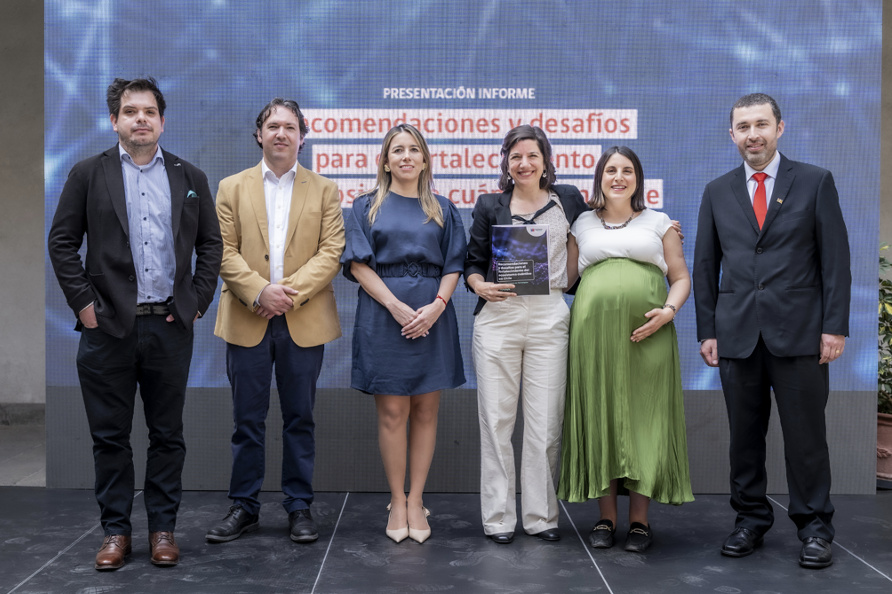Quantum Experts Deliver Strategic Recommendations For Advancing Quantum Technologies in Chile

Insider Brief
- An expert commission has presented a report outlining strategic recommendations to advance Chile’s quantum technology ecosystem, emphasizing applications in mining, renewable energy and cybersecurity.
- Since 1983, the Chilean state has invested over 20 billion pesos in quantum research, funding more than 300 projects.
- The new roadmap focuses on collaboration between the government, private sector and academia to create infrastructure and develop talent.
- The Expert Commission suggests forming a National Commission on Quantum Technologies, investing in laboratories, and developing programs to attract talent.
PRESS RELEASE — Quantum technologies will have very concrete applications in our daily lives. In the field of health, quantum sensors and computers could help us detect diseases and design personalized treatments for each patient, based on precise molecular simulations, and develop medications much faster. In cybersecurity, the information we share online, such as our banking transactions or personal data, will soon need to be protected by quantum keys that are impossible to hack. Another example is in logistics: with the power of quantum computing, transportation and distribution routes for goods will be optimized so that products arrive faster and at a lower cost, directly impacting the prices of the goods we consume.
With those examples, Minister Aisén Etcheverry presented today the report ‘Recommendations and Challenges for Strengthening the Quantum Ecosystem in Chile’ at the Palacio de La Moneda. This is a technical report requested by the Ministries of the Interior and Science from a group of national specialists to ensure that Chile secures a leadership position in this area, which is so relevant internationally that the UN has declared 2025 as the International Year of Quantum Sciences and Technologies.
Prepared by the Expert Commission on Quantum Technologies, the document contains a roadmap with strategic recommendations to advance this field, which has been present in Chile since 1983. Since that year, through various funding programs (Fondecyt, Fondef, and others), the State has allocated more than 20 billion pesos to research projects related to quantum technologies. In total, over 300 projects led by various academics have been funded.
Thanks to this, Chile now has the opportunity to become a relevant player in Latin America, especially in quantum applications in areas such as mining, renewable energy, and cybersecurity. The international market for these technologies is projected to be worth hundreds of billions of dollars by 2040, and Chile has a clear roadmap today that includes collaboration between the government, the private sector, and academia, fundamentally focused on creating infrastructure, developing talent, and promoting research,’ added the Minister of Science.
As explained by Secretary Carolina Gainza, Chile has invested in fundamental research in quantum mechanics, quantum physics, and other related areas and disciplines for several decades, research that is now being carried out by universities and research centers funded by ANID. ‘Technologies do not arise in a vacuum; this investment today puts us in an excellent position to tackle the challenges of quantum technologies and develop them for health, industry, security, and other fields, with the aim of contributing to the well-being of all who inhabit our country, just as we are working on cybersecurity based on research and solid data from expert studies.
The developments in quantum technologies, vital for Chile to remain competitive in the global economy, are based on the principles of quantum mechanics, a branch of physics that describes how matter and energy function at the level of very small particles. Today, they promise significant improvements in areas such as cybersecurity, energy efficiency, metrology, and advanced computing.
Recommendations from the commission
The Expert Commission on Quantum Technologies, composed of prominent scientists from national and international institutions, was convened last May with the purpose of advising the government on the design of public policies and quantum development strategies. The report includes 15 recommendations for Chile to become a leader in this field, categorized into seven areas: Governance and Regulation, International Collaboration, Infrastructure, Workforce, Education, Research and Development, and Collaboration with the Private Sector.
Among these, the need for the country to define a national plan to promote these technologies is established, which includes developing norms and regulations to ensure their growth in an orderly and safe manner. Additionally, the creation of a National Commission on Quantum Technologies is suggested, which would be responsible for coordinating efforts among universities, the government, and the private sector. It is also recommended to invest in new laboratories and develop programs to attract and retain talent in quantum areas, as the success of these technologies depends on having highly skilled individuals. The importance of creating competitive funds to support research in this field, promoting the creation of startups, and developing quantum solutions for key sectors of the economy such as mining and cybersecurity is also highlighted.
The recommendations aim for Chile not only to leverage quantum technologies to improve the country’s competitiveness but also to create new industries and high-specialization jobs.
The commission worked for 120 days on the preparation of the report, gathering data and formulating concrete proposals, and was composed of eight specialists in the field:
- Francisco Albarrán, University of Santiago de Chile.
- Paulina Assmann, Sequre Quantum.
- Aldo Delgado, Millennium Institute for Research in Optics (MIRO).
- Dardo Goyeneche, Pontifical Catholic University of Chile.
- Carla Hermann, University of Chile.
- Stephen Walborn, University of Concepción.
- Claudio Torres, Federico Santa María Technical University.
- Sabina Torres, Ministry of the Interior and Public Security.
“Chile is consolidating itself as a regional leader in quantum technologies. With a strong scientific base and a clear commitment from our government, the country can lead the quantum revolution in Latin America, just as we are already doing in artificial intelligence. Advancing the implementation of the recommendations in this report will allow us to seize the opportunities offered by these disruptive technologies and generate a significant impact on our economy, positioning ourselves, why not, as a hub for quantum innovation”, concluded Minister Etcheverry.
